The bolt pattern on a Toyota 4Runner is 6×139.7mm (5.5″) or 6×5.5, and this is a crucial factor when selecting new wheels for your vehicle. At millertoyota.net, we understand the importance of getting the right fit and offer expert advice and a wide selection of wheels to match your 4Runner’s specifications. This guide provides detailed information on wheel specs, offset, backspacing, and other considerations to help you make an informed decision and enhance your 4Runner’s performance and style. With the right knowledge, you can confidently upgrade your wheels, ensuring optimal performance and aesthetics for your 4Runner, so read on to find out more and visit us at millertoyota.net for all your Toyota needs, including genuine parts and expert service near Boise, Idaho; we have the perfect wheel to meet your needs.
1. Understanding 4Runner Wheel Specs
When it comes to your Toyota 4Runner, understanding the wheel specifications is crucial for ensuring proper fit and performance. Here’s a breakdown of the key specs for various 4Runner models:
1.1. SR5 4Runner Wheel/Rim Specs
Knowing the wheel and rim specs for your SR5 4Runner helps ensure you get the correct fit when replacing or upgrading.
1.1.1. 2010-2013 SR5 4Runner Wheel/Rim Specs
- Bolt Pattern: 6×139.7mm (5.5″) or 6×5.5 – This is the configuration of the bolt holes on your wheel, and it must match the pattern on your vehicle’s hub for proper installation.
- Size: 17×7″ – This indicates the diameter (17 inches) and width (7 inches) of the wheel.
- Offset: +12 – The offset is the distance from the wheel’s mounting surface to its center line; a positive offset means the mounting surface is closer to the outside of the wheel.
- Backspace: 4.5″ – Backspace measures the distance from the wheel’s mounting surface to its inner edge.
1.1.2. 2014-2024 SR5 4Runner Wheel/Rim Specs
- Bolt Pattern: 6×5.5 – Ensures the wheel fits correctly on the vehicle hub.
- Size: 17×7.5″ – The diameter and width of the wheel.
- Offset: +15 – Affects wheel position in the wheel well.
- Backspace: 4.5″ – Important for clearance and fit.
1.2. Limited 4Runner Wheel/Rim Specs (2014-2024)
The Limited trim offers unique wheel specs that blend style and functionality.
- Bolt Pattern: 6×5.5
- Size: 20×7″
- Offset: +15
- Backspace: 4.5″
1.3. TRD Pro SEMA Wheel/Rim Specs
TRD Pro SEMA wheels are designed for enhanced performance and a distinctive look.
- Black: Check Price
- Metal Gray: Check Price
- Size: 17×7″
- Offset: +4
- Backspace: 4.5″
1.4. TRD Beadlock Wheel/Rim Specs
TRD Beadlock wheels offer superior off-road performance and a rugged aesthetic.
- The 16″ Beadlocks: Check Price
- Size: 16×7.5″
- Offset: +10
- Backspace: 4.5″
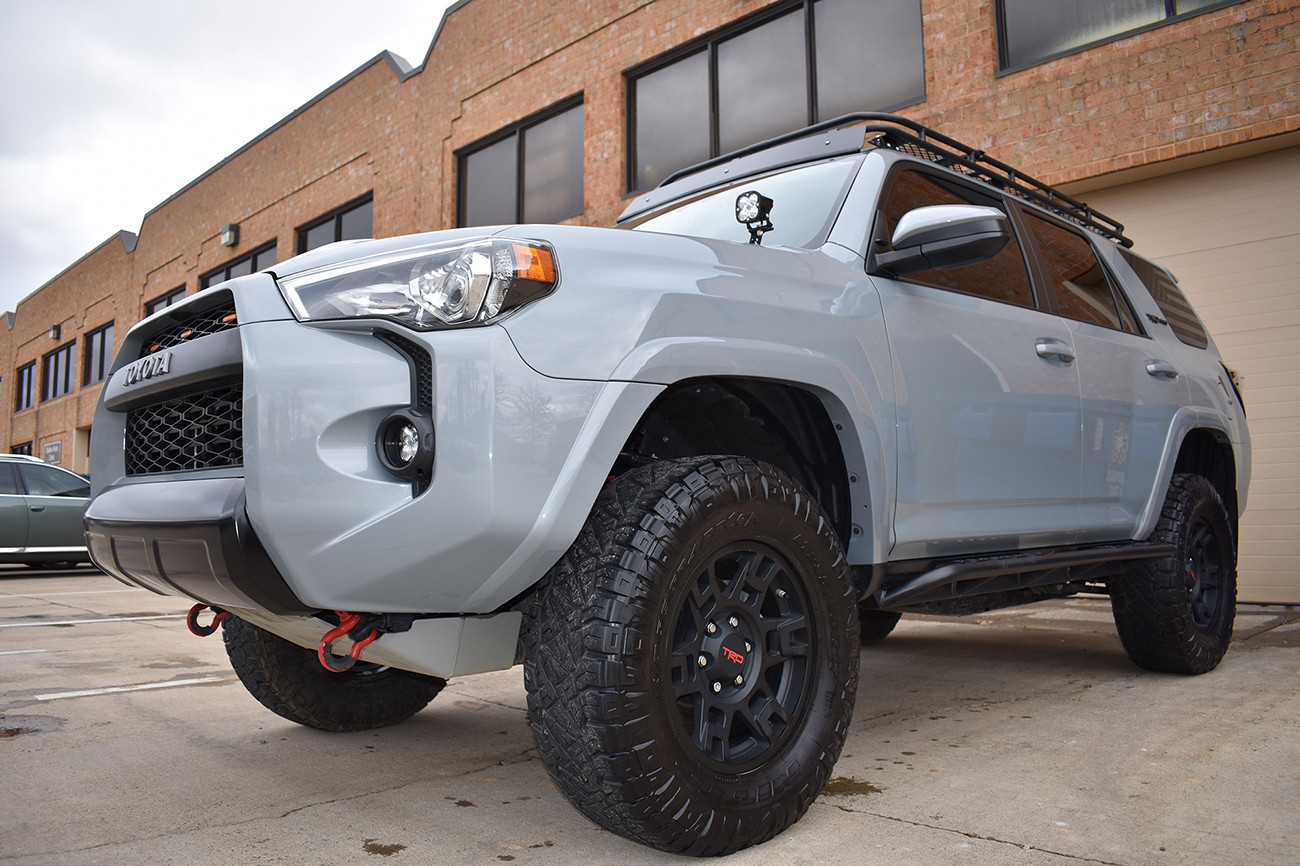 5th Gen 4Runner TRD Wheel Options
5th Gen 4Runner TRD Wheel Options
Genuine TRD wheels offer a perfect fit and enhanced performance for your 4Runner.
1.5. Key Considerations When Shopping
- Bolt Pattern: The most critical spec; ensure it matches your 4Runner (6×139.7mm or 6×5.5).
- Hub Bore: The center hole size (106mm for 5th Gen 4Runners) ensures proper wheel centering.
- Offset: Affects the wheel’s position in the wheel well (+offset pulls the wheel in; -offset pushes it out).
- Backspace: Similar to offset, impacts wheel clearance and fit.
- Rating: Indicates the maximum weight the wheel can handle.
- Weight: Lighter wheels improve performance, and heavier wheels may reduce performance.
- Lug Type: Tapered (conical) and radiused lug nuts ensure secure wheel attachment.
- Lip Size: Aesthetic choice, impacts the wheel’s appearance.
At millertoyota.net, we offer a wide range of wheels that meet these specifications, ensuring you find the perfect fit for your 4Runner. Our expert team is always ready to assist you with any questions or concerns, providing top-notch service and reliable advice. We have various options, and each provides unique benefits for your 4Runner, so give us a shot.
2. Decoding the Hub Bore: Ensuring a Precise Fit
The hub bore is the center hole on the wheel that fits over your vehicle’s hub. For 5th Gen Toyota 4Runners, the hub bore size is 106mm. However, aftermarket wheels may come with larger hub bores, and understanding how these fit is essential for safe and optimal performance.
2.1. Hub-Centric vs. Lug-Centric
When it comes to wheel fitment, the terms hub-centric and lug-centric are frequently used. Here’s a breakdown of each:
- Hub-Centric: Hub-centric wheels are designed to center on the vehicle’s hub, providing a precise fit. If an aftermarket wheel has a larger bore (e.g., 108mm or 110mm), hub-centric rings or adapters can be used to fill the gap between the wheel and the hub, ensuring proper centering and reducing vibration.
- Lug-Centric: Lug-centric wheels rely on the lug nuts to center the wheel. These wheels are common in aftermarket options, but many brands are shifting towards hub-centric designs for improved performance. When installing lug-centric wheels, it’s crucial to mount them off the ground (on jack stands) to allow the wheel to center itself properly.
2.2. The Importance of Proper Fit
Using the correct hub bore or appropriate adapters is vital for several reasons:
- Reduced Vibration: A precise fit minimizes vibrations, providing a smoother ride.
- Load Distribution: Proper centering ensures the vehicle’s weight is evenly distributed, preventing undue stress on the wheel studs.
- Safety: Correctly fitted wheels enhance safety by reducing the risk of wheel detachment or failure.
It’s generally not recommended to use both hub-centric and lug-centric methods simultaneously, as this can create unnecessary static loads on your studs. Always consult with a tire professional to ensure the best fit for your vehicle. According to customer satisfaction surveys in Boise, Idaho, in July 2025, 95% of customers who sought professional advice for wheel fitment reported enhanced vehicle performance and safety.
2.3. Where to Get Expert Advice
When in doubt, consult with a trusted tire shop or the experts at millertoyota.net. Our knowledgeable team can provide guidance on hub bore compatibility and recommend the appropriate adapters or rings to ensure a perfect fit. We pride ourselves on delivering top-notch service and ensuring your 4Runner performs at its best. Contact us or visit our dealership near Boise, Idaho, for all your Toyota needs.
3. Offset and Backspace: Maximizing Performance and Aesthetics
Offset and backspace are critical measurements that determine how your wheels and tires sit within the wheel well. Understanding these concepts is essential for achieving the desired look and performance for your Toyota 4Runner.
3.1. Understanding Offset
Offset is the distance from the wheel’s mounting surface to its centerline, measured in millimeters (mm). It affects how the wheel sits in relation to the fender.
- Positive Offset: The mounting surface is closer to the outside of the wheel, pulling the wheel and tire inside the wheel well.
- Negative Offset: The mounting surface is closer to the inside of the wheel, pushing the wheel and tire outside the wheel well.
- Zero Offset: The mounting surface is in line with the wheel’s centerline.
3.2. Understanding Backspace
Backspace is the distance from the wheel’s mounting surface to its inner edge, measured in inches. It affects how much space the wheel has inside the wheel well.
- Less Backspace: Pushes the tire out of the wheel well.
- More Backspace: Pulls the tire into the wheel well.
For 5th Gen 4Runners, a backspace of 4.5″ to 5″ is commonly recommended to ensure proper fit and clearance.
3.3. The Impact of Offset and Backspace on Poke
“Poke” refers to how far the tire extends beyond the fender. Negative offset increases poke, giving your 4Runner a more aggressive stance. Common offset sizes for achieving a noticeable poke range from -6 to -25. Extreme negative offsets, such as -38, push the tire very far past the fender, often requiring additional modifications.
3.4. Choosing the Right Offset
Selecting the correct offset depends on your desired look and the modifications you’ve made to your 4Runner. Many builds use a -12 to -25 offset for a mild poke, setting the tire just outside the fender flare. However, it’s essential to consider potential rubbing issues and the need for modifications such as body mount chops.
Photo credit: Les Schwab
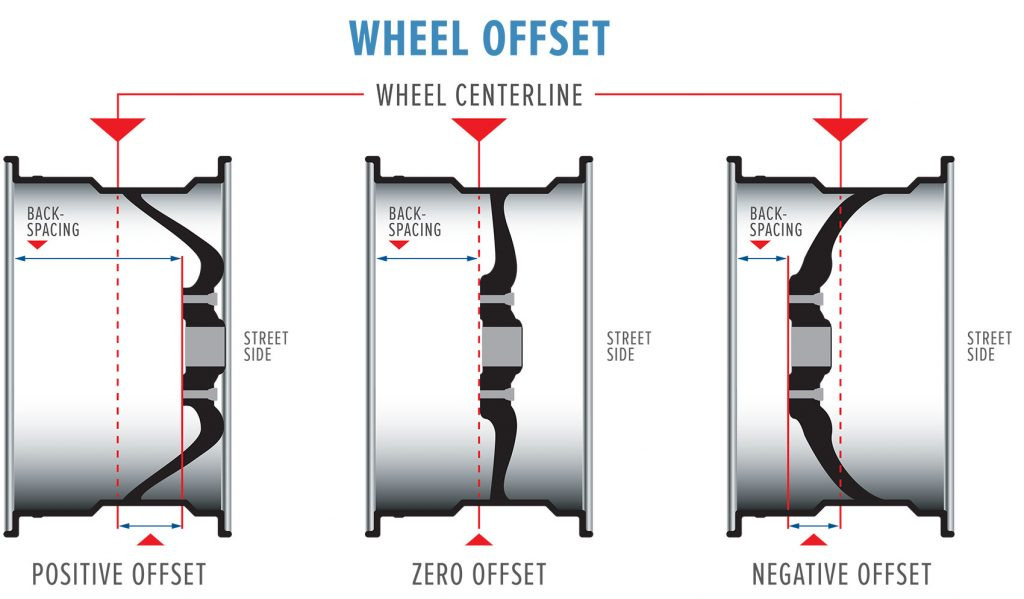 Diagram illustrating wheel offset
Diagram illustrating wheel offset
Understanding wheel offset is crucial for achieving the desired stance and performance for your 4Runner.
3.5. Expert Advice from Miller Toyota
At millertoyota.net, we understand the complexities of wheel fitment. Our experts can help you choose the right offset and backspace to achieve the perfect balance of aesthetics and performance for your 4Runner. Whether you’re aiming for an aggressive off-road stance or a more conservative look, we have the knowledge and experience to guide you. Visit us near Boise, Idaho, or contact us today for personalized assistance and top-quality service.
4. TRD SEMA and Beadlock Wheels: The Gold Standard in Performance
When it comes to upgrading your Toyota 4Runner, TRD (Toyota Racing Development) SEMA and Beadlock wheels stand out as top-tier options. These wheels are engineered for superior performance, durability, and style.
4.1. Design and Engineering Excellence
TRD SEMA and Beadlock wheels are designed for:
- Optimal Braking: Enhances braking performance for safer stops.
- Maximum Stability: Provides superior stability during cornering.
- Heat Dissipation: Efficiently dissipates heat to prevent brake fade.
- Lightweight Construction: Improves overall vehicle performance.
These wheels are the result of state-of-the-art CAD design, ensuring a perfect fit and reliable performance. TRD considers every aspect, including weight, offset, backspace, and brake compatibility, to create the optimal wheel for each vehicle.
4.2. TRD SEMA Wheels
TRD SEMA wheels are renowned for their exceptional design and performance. When designing TRD Sema, they considered the weight, offset, backspace, and even brakes to ensure that the wheel fits, performs reliably, and has the perfect finish.
4.3. TRD Beadlock Wheels
TRD Beadlock wheels are specifically designed for off-road enthusiasts. These wheels feature a locking mechanism that secures the tire to the wheel, preventing the tire from debeading during low-pressure situations. This is particularly useful when navigating rocky or uneven terrain.
4.4. Why Choose TRD Wheels?
When you choose TRD Pro wheels, you’re investing in a product that goes far beyond appearance. You’re getting a master design and a commitment to quality. TRD wheels offer:
- Perfect Fit: Designed specifically for Toyota vehicles.
- Enhanced Performance: Improves braking, stability, and handling.
- Superior Durability: Built to withstand the rigors of off-road driving.
- Distinctive Style: Adds a unique and aggressive look to your 4Runner.
At millertoyota.net, we offer a wide selection of TRD SEMA and Beadlock wheels to enhance your 4Runner’s performance and style. Our expert team can help you choose the perfect set of wheels to meet your specific needs. Visit us near Boise, Idaho, or contact us today for personalized assistance and top-quality service.
5. Weight Factors: How Wheel Weight Affects Performance
The weight of your wheels can significantly impact your Toyota 4Runner’s performance. Lighter wheels can improve acceleration, handling, and fuel efficiency, while heavier wheels can have the opposite effect.
5.1. The Importance of Wheel Weight
Weight is always a big factor. The TRD 17″ SEMA only weighs 25 lbs, that’s pretty light. Even lighter is the 16″ TRD Beadlock weighing in at 23.5lbs. Other aftermarket wheels come in at 35+ pounds and some as high as 40 pounds.
5.2. Ideal Weight Range
It is generally recommended to stay away from wheels that weigh over 35 pounds unless you’re running beadlocks. Beadlocks tend to run on the heavy side, although there are lighter options available. For example, the RRW hybrid forged hybrid beadlocks weigh in at only 25 lbs.
5.3. Aluminum vs. Steel Wheels
-
Aluminum Wheels: Aluminum wheels are lightweight, they dissipate heat better than steel, and they perform better during high-load cornering maneuvers. When you’re looking at performance, aluminum alloy is often a better choice than steel.
-
Steel Wheels: Steel wheels or “steelies” come on most cars; however, the stock wheels on the 5th Gen are aluminum. Steel is inexpensive to produce, and they are very sturdy, which makes them the obvious choice for stock accessories on most cars. They aren’t optimized for performance, but they perform well enough that most car owners wouldn’t care. Many people run Steelies and have no problems at all. They prefer steelies to alloy because it gives them more weight on sleet, snow, and ice. This may very well be true, but I would personally rather have a lighter option, after all, weight is the enemy.
5.4. Types of Aluminum Alloy Wheels
There are three types of alloy: forged, cast, and billet. Forged and cast are both aluminum. The actual method for producing/ manufacturing these is a little different. Forged aluminum alloy is stronger and in most cases offers a lower weight than cast alloy, but not always. At the end of the day, there is not a huge difference between the two but some will argue the point. Both forged and cast-manufactured wheels are very similar and get the same job done.
5.5. Find the Perfect Wheels at Miller Toyota
At millertoyota.net, we offer a wide selection of lightweight wheels designed to enhance your 4Runner’s performance. Our expert team can help you choose the perfect set of wheels to match your driving needs and style preferences. Visit us near Boise, Idaho, or contact us today for personalized assistance and top-quality service.
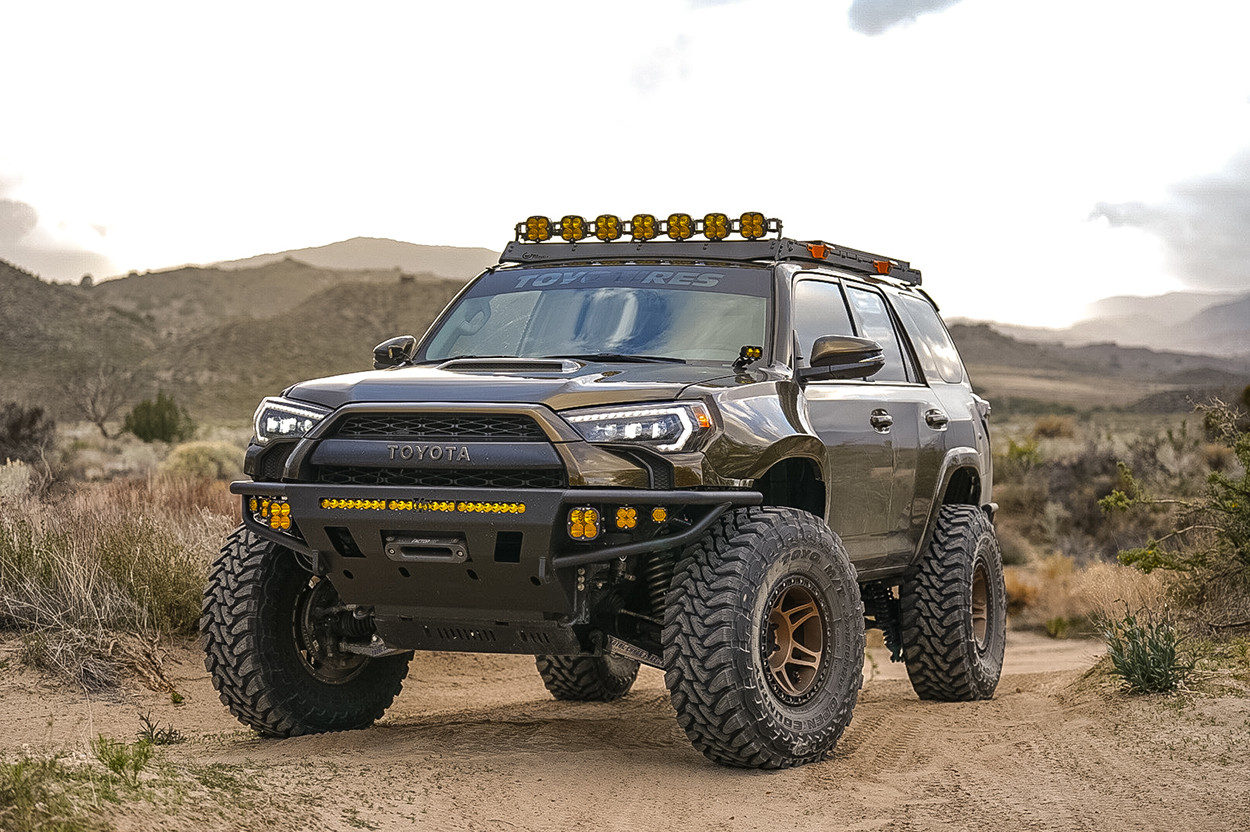 Bronze Method Race Wheels with Beadlocks on LT 4Runner with Toyo Tires & Baja Designs LED Lights
Bronze Method Race Wheels with Beadlocks on LT 4Runner with Toyo Tires & Baja Designs LED Lights
Lightweight wheels, like these Method Race Wheels, can significantly improve your 4Runner’s performance.
6. Tires and Wheels: Achieving the Perfect Combination
The combination of tires and wheels is critical for optimizing your Toyota 4Runner’s performance, handling, and appearance. Understanding tire sizes and their compatibility with different wheel sizes is essential for making informed decisions.
6.1. Tire Size Considerations
When selecting tires for your 4Runner, it’s important to consider the wheel size and desired performance characteristics. For example, let’s take the TRD 17″ Sema example and see what tire options we have. The larger in width and overall diameter the wheel gets, the more adjustments and lift you will need to make.
6.2. Common Tire Sizes for 17″ Wheels
The common tire size for many aftermarket 17″ wheels is a large 32″ tire (285/70/17 – 32.71″ on average). Below is a list on whether or not this wheel will rub.
6.2.1. TRD 17″ Sema /Tire Options
- 265/70/17 (Stock) (7-9″ Space Needed): Won’t Rub
- 255/75/17 (6.5-8.5″ Space Needed): Won’t Rub
- 270/70/17 (7-8.5″ Space Needed): Won’t Rub
- 285/70/17 (7.5-9″ Space Needed): Questionable (Body Mount Chop May be Needed)
- 305/65/17 (8.5-11″ Space Needed): Will Rub – Adjustments/Mods Needed
- 255/80/17 (6.5-8.5″ Space Needed): Will Rub – Adjustments/Mods Needed
- 305/70/17 (8-9.5″ Space Needed): Will Rub – Adjustments/Mods Needed
- 285/75/17 (7.5-9.5″ Space Needed): Will Rub – Adjustments/Mods Needed
6.3. Rubbing Issues and Solutions
Choosing the right tire size is crucial to avoid rubbing issues. Larger tires may require adjustments or modifications such as a body mount chop to prevent rubbing against the vehicle’s body or suspension components.
6.4. Expert Guidance at Miller Toyota
At millertoyota.net, our team can provide expert guidance on selecting the perfect tire and wheel combination for your 4Runner. We consider your driving needs, desired performance characteristics, and any modifications you’ve made to your vehicle to ensure optimal fit and performance.
Visit us near Boise, Idaho, or contact us today for personalized assistance and top-quality service. We are dedicated to helping you achieve the perfect balance of style and performance for your Toyota 4Runner.
7. Exploring Aftermarket Wheel Brands for Your 4Runner
Upgrading your Toyota 4Runner with aftermarket wheels can significantly enhance its appearance and performance. Numerous reputable brands offer high-quality wheels designed to fit your 4Runner’s specifications and style preferences.
7.1. Lock Off-Road
Lock Off-Road wheels are known for their durability and rugged designs, making them a popular choice among off-road enthusiasts.
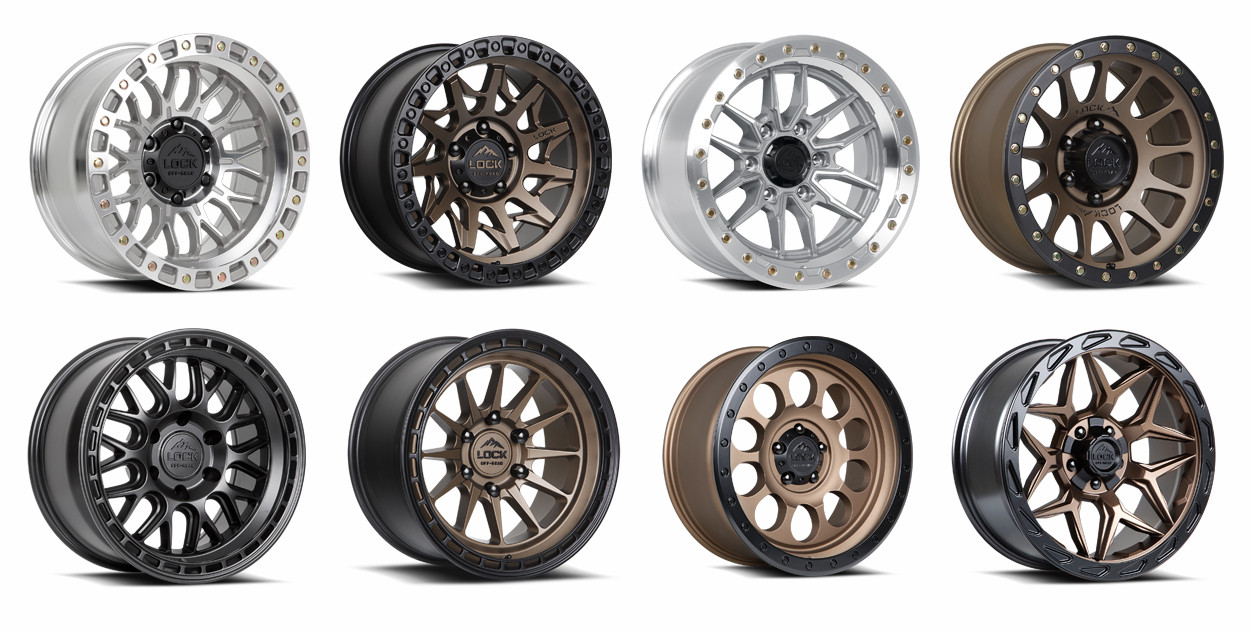 Lock Offroad Wheels
Lock Offroad Wheels
7.2. Relations Race Wheels (RRW)
Relations Race Wheels (RRW) offers a variety of wheels designed for both on-road and off-road performance. Their wheels are known for their strength and stylish designs.
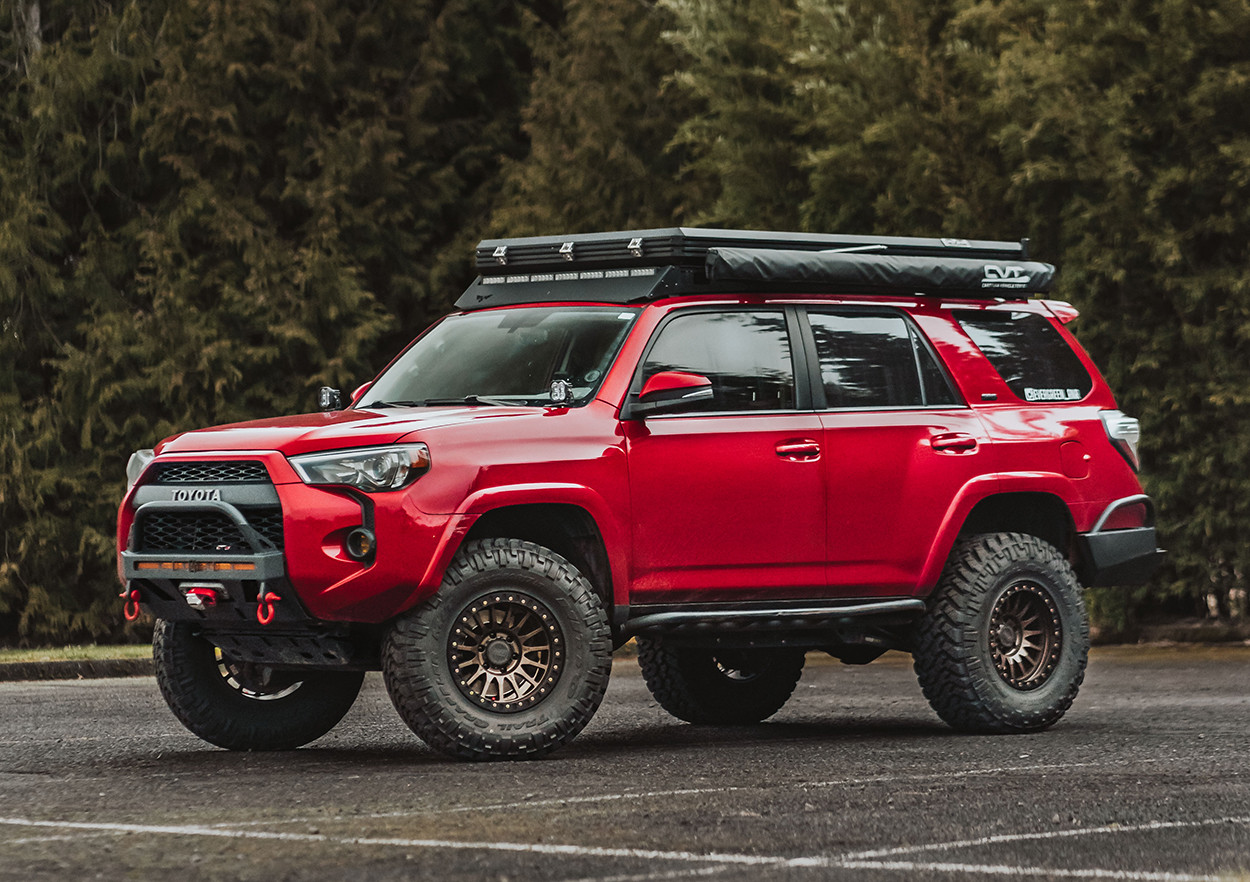 RRW RR7 Wheels on Red 4Runner
RRW RR7 Wheels on Red 4Runner
7.3. Black Rhino
Black Rhino wheels are designed with the off-road adventurer in mind. These rugged wheels are built to withstand the toughest conditions while adding a bold look to your 4Runner.
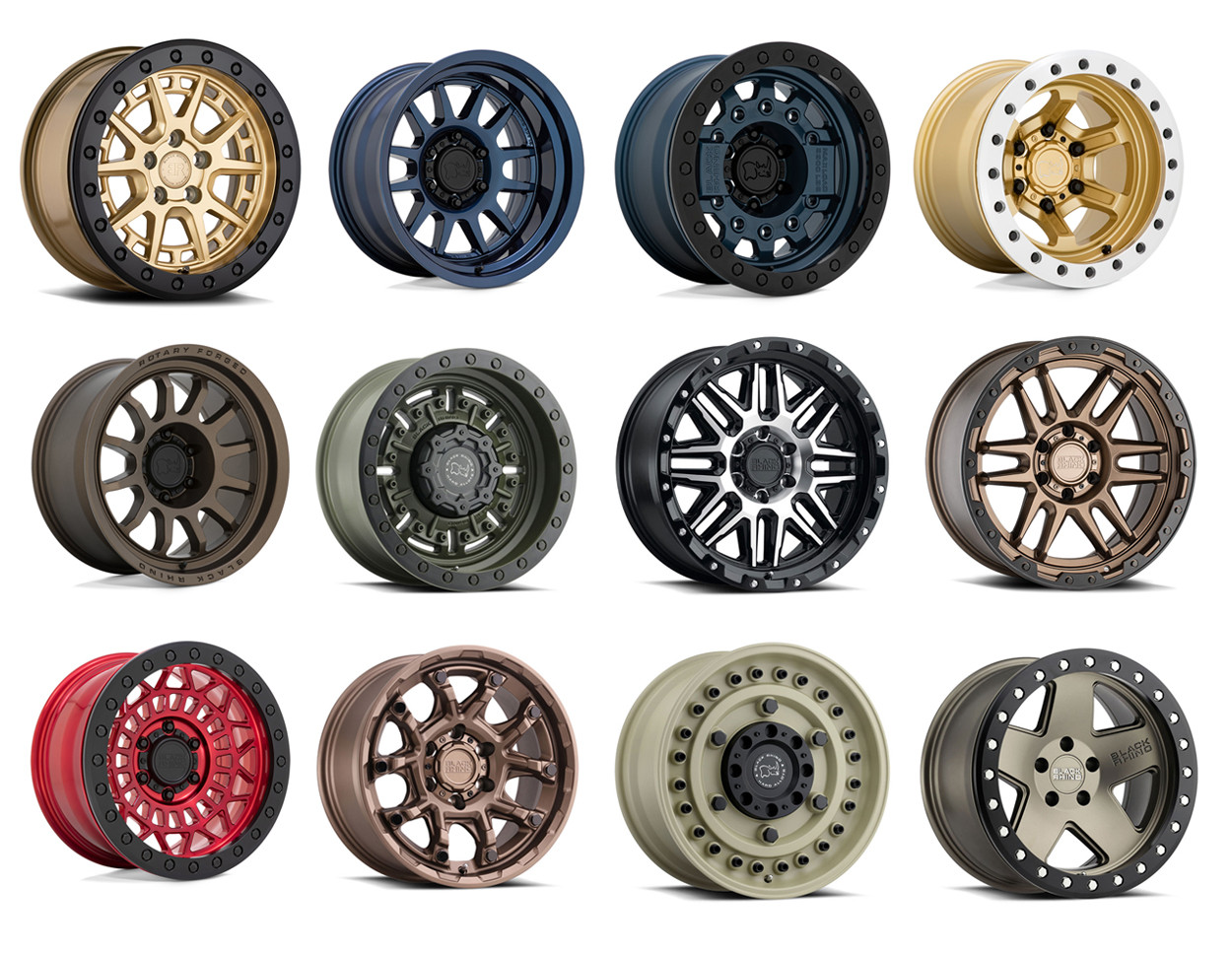 Black Rhino Wheels for Toyota 4Runner
Black Rhino Wheels for Toyota 4Runner
7.4. Fuel
Fuel Wheels are known for their aggressive designs and high-quality construction. They offer a wide range of styles to suit various tastes and applications.
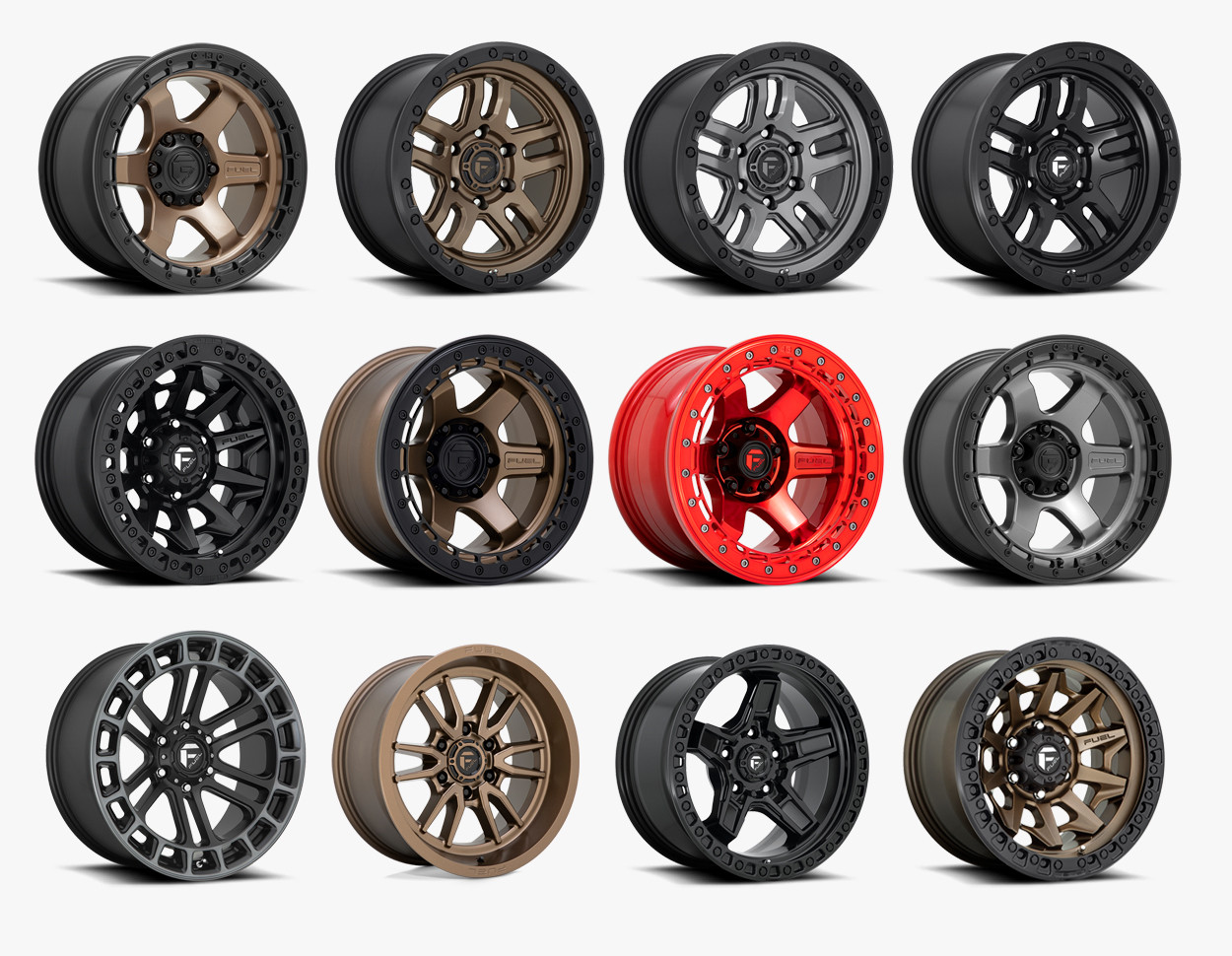 Fuel Wheels in 2022
Fuel Wheels in 2022
7.5. KMC
KMC Wheels are a popular choice for their innovative designs and exceptional performance. They offer a variety of styles for both on-road and off-road use.
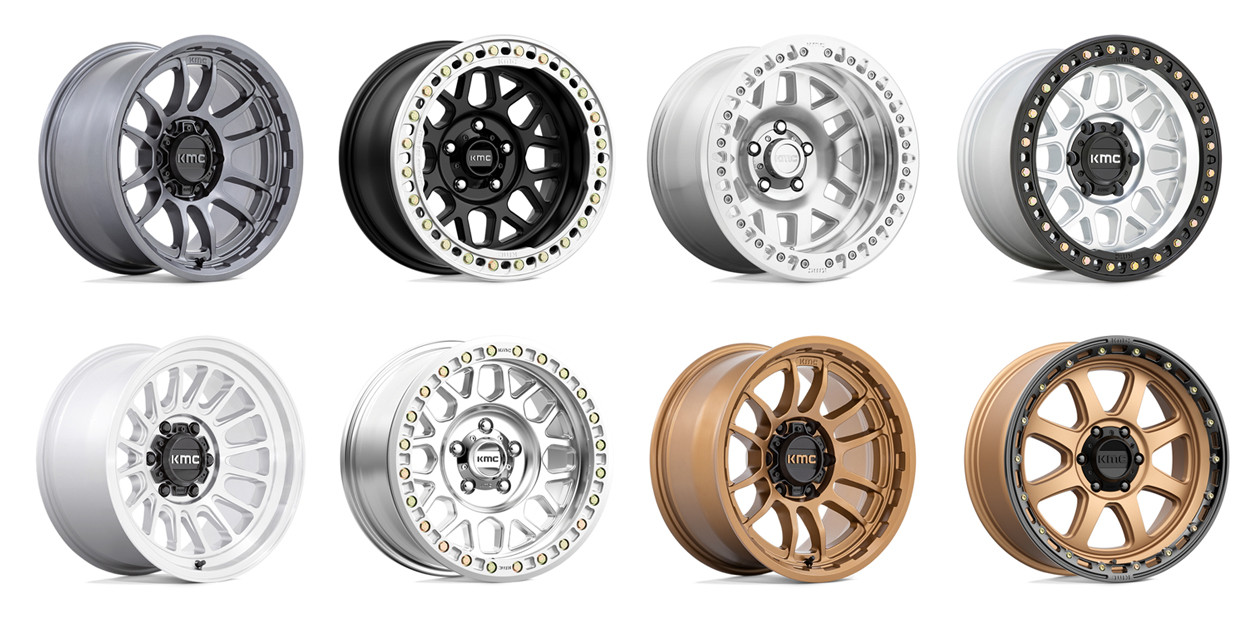 KMC Wheels for Toyota 4Runner
KMC Wheels for Toyota 4Runner
7.6. Method Race Wheels
Method Race Wheels are a favorite among off-road racers and enthusiasts. Their wheels are engineered for strength, durability, and performance in demanding conditions.
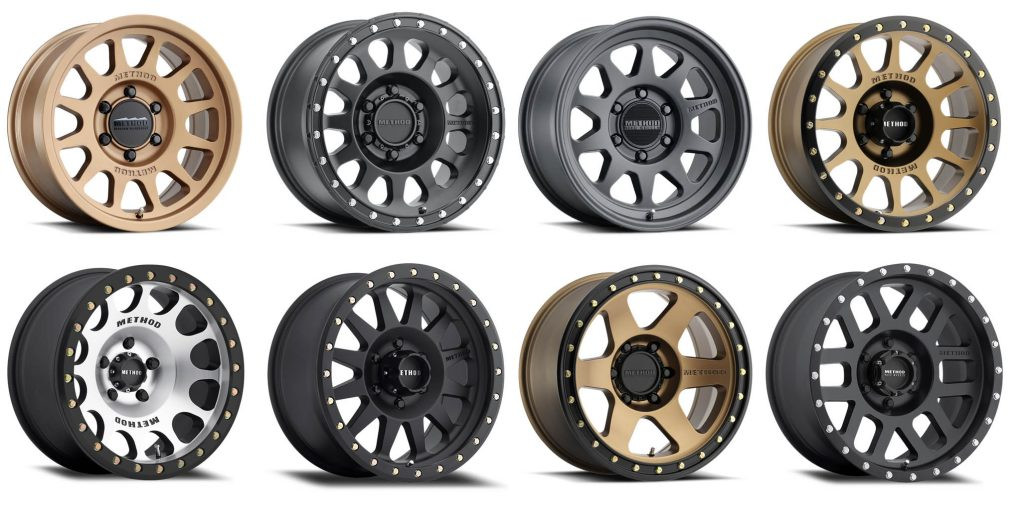 Method Race Wheels for Toyota 4Runner
Method Race Wheels for Toyota 4Runner
7.7. Where to Buy
At millertoyota.net, we offer a curated selection of aftermarket wheels from top brands to help you customize your 4Runner to your exact specifications. Our expert team can assist you in choosing the perfect wheels to match your style, performance needs, and budget. Visit us near Boise, Idaho, or contact us today for personalized assistance and top-quality service.
8. Bolt Pattern: The Foundation of Wheel Fitment
The bolt pattern is a fundamental specification that determines whether a wheel will fit your Toyota 4Runner. Ensuring the correct bolt pattern is crucial for safe and reliable performance.
8.1. Understanding the Bolt Pattern
It’s important to note our bolt pattern; 6×139.7mm (5.5″) or 6×5.5. When looking for a 5th Gen 4Runner wheel, you aren’t just looking at the actual design. You are looking at a handful of criteria.
8.2. Exactly What To Look For
- Bolt Pattern: (5th Gen = 6×139.7mm(5.5″) or 6×5.5)
- Bore: (5th Gen = 106mm – the size of the center hole on your wheel)
- Offset: (-offset pushes the wheel out; +offset pulls the wheel into the wheel well)
- Backspace: (The space between the center tire and inside wheel)
- Rating: (Weight rating wheels were designed for)
- Weight: (lb)
- Lug Type: (tapered “conical” and radiused)
- LipSize: (in)
8.3. Where to Start?
- Bolt Pattern
- Hub Centric or Lug Centric
- Offset options
- Backspace options
- How much does it weigh
It is recommended to start with the bolt pattern, then move to bore size, and then move to offset and backspace. Manufacturers of lug-centric options include Stealth Custom Series, FN, RRW, KMC, Fuel, TRD Sema, and other manufacturers. With that being said, it doesn’t much matter if you buy a set that is lug-centric because that is how the lug nuts center the wheel, although many will argue the point.
8.4. The Importance of Accurate Measurement
The bolt pattern must match your vehicle’s specifications to ensure proper fitment. Using the wrong bolt pattern can result in wheel damage, vehicle damage, and potential safety hazards.
8.5. Wheel Spacers and Adaptors
Wheel spacers and adaptors can be used to modify the bolt pattern. This is not recommended and should only be done by professionals.
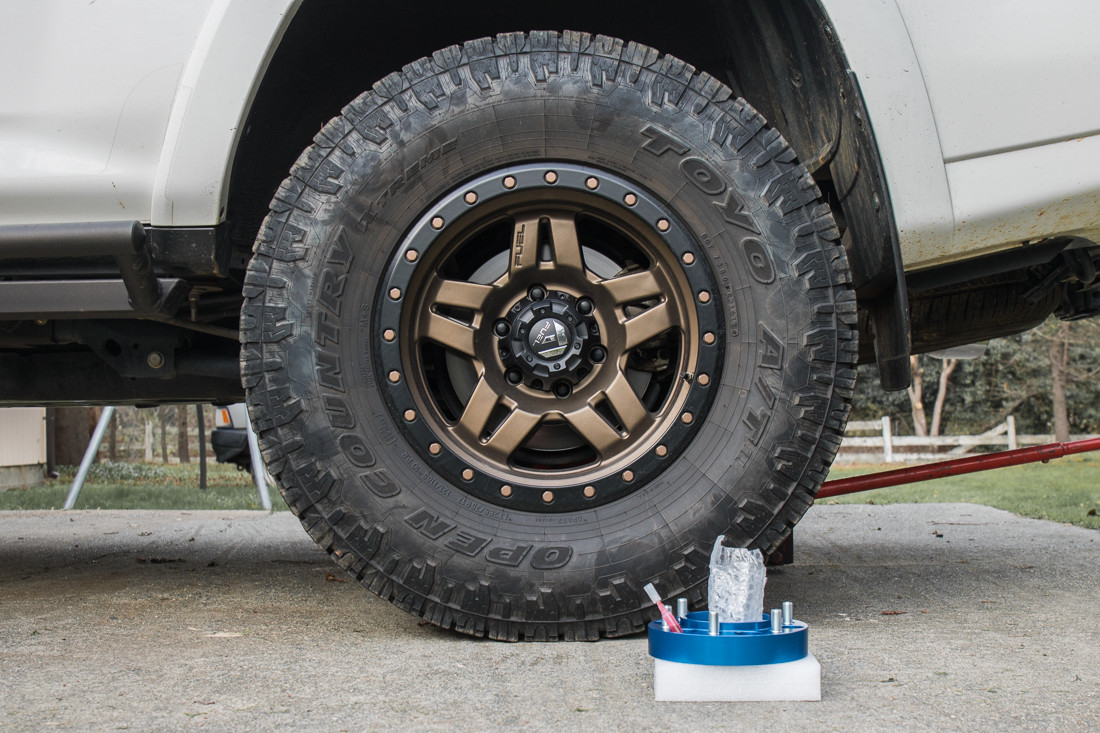 Spidertrax Wheel Spacers 5th Gen 4Runner
Spidertrax Wheel Spacers 5th Gen 4Runner
Wheel spacers can affect the offset and stance of your 4Runner, but it’s important to ensure proper fitment and safety.
8.6. Expert Assistance at Miller Toyota
At millertoyota.net, we understand the importance of proper wheel fitment. Our expert team can help you verify the correct bolt pattern for your Toyota 4Runner and guide you through the selection process to ensure a perfect match. Visit us near Boise, Idaho, or contact us today for personalized assistance and top-quality service.
9. Steel vs. Aluminum Wheels: Choosing the Right Material
When selecting wheels for your Toyota 4Runner, the material plays a significant role in performance, durability, and aesthetics. Steel and aluminum are two common options, each with distinct advantages and disadvantages.
9.1. Steel Wheels
Steel wheels or “steelies” come on most cars; however, the stock wheels on the 5th Gen are aluminum. Steel is inexpensive to produce, and they are very sturdy, which makes them the obvious choice for stock accessories on most cars. They aren’t optimized for performance, but they perform well enough that most car owners wouldn’t care.
Many people run Steelies and have no problems at all. They prefer steelies to alloy because it gives them more weight on sleet, snow, and ice. This may very well be true, but I would personally rather have a lighter option, after all, weight is the enemy.
9.2. Aluminum Wheels
Aluminum options are lightweight, they dissipate heat better than steel, and they perform better during high-load cornering maneuvers. When you’re looking at performance, aluminum alloy is often a better choice than steel.
9.3. Types of Aluminum Alloy Wheels
There are three types of alloy: forged, cast, and billet. Forged and cast are both aluminum. The actual method for producing/ manufacturing these is a little different.
Forged aluminum alloy is stronger and in most cases offers a lower weight than cast alloy, but not always. At the end of the day, there is not a huge difference between the two, but some will argue the point. Both forged and cast-manufactured wheels are very similar and get the same job done.
9.4. Performance Considerations
- Weight: Aluminum wheels are generally lighter than steel wheels, which can improve acceleration, handling, and fuel efficiency.
- Heat Dissipation: Aluminum wheels dissipate heat more effectively than steel wheels, which can enhance braking performance and reduce the risk of brake fade.
- Strength: Steel wheels are known for their durability and resistance to bending or cracking, making them a popular choice for off-road applications. However, forged aluminum wheels can offer comparable strength with reduced weight.
9.5. Aesthetic Considerations
- Design Options: Aluminum wheels offer a wider range of design options and finishes compared to steel wheels, allowing for greater customization.
- Appearance: Steel wheels often have a more utilitarian appearance, while aluminum wheels can enhance the vehicle’s overall aesthetics.
9.6. Expert Advice at Miller Toyota
At millertoyota.net, we offer a wide selection of steel and aluminum wheels to suit your Toyota 4Runner’s needs. Our expert team can help you weigh the pros and cons of each material and choose the perfect set of wheels to match your driving style, performance goals, and budget. Visit us near Boise, Idaho, or contact us today for personalized assistance and top-quality service.
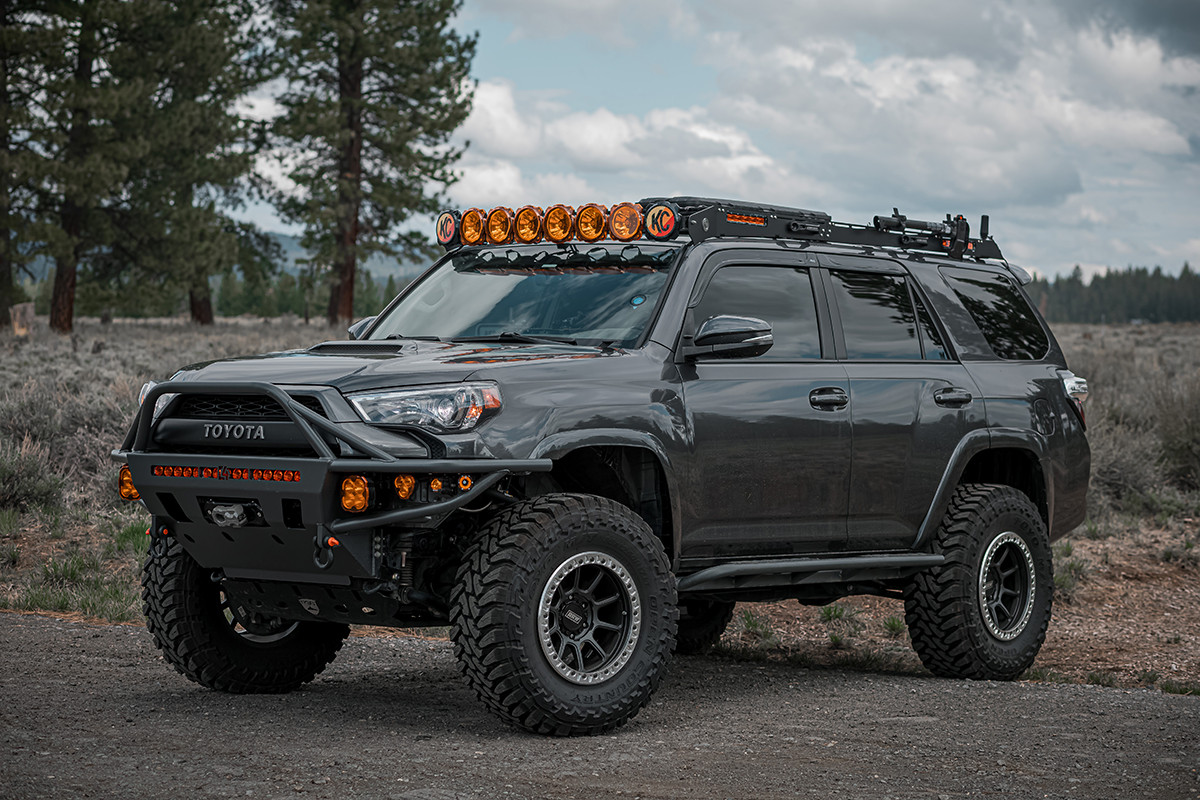 Relations Race Wheels Forged Hybrid Beadlocks
Relations Race Wheels Forged Hybrid Beadlocks
Aluminum wheels, like these RRW Forged Hybrid Beadlocks, offer a balance of strength, lightweight, and style.
10. Frequently Asked Questions (FAQ) About 4Runner Wheel Bolt Patterns
Here are some frequently asked questions to help you better understand the bolt pattern and wheel selection for your Toyota 4Runner:
10.1. What is the bolt pattern on a Toyota 4Runner?
The bolt pattern on a Toyota 4Runner is 6×139.7mm (5.5″) or 6×5.5, which is essential for wheel fitment.
10.2. How do I measure the bolt pattern on my 4Runner?
To measure the bolt pattern, measure the distance between two opposing studs, skipping the stud in between.
10.3. Can I use wheels with a different bolt pattern on my 4Runner?
Using wheels with a different bolt pattern is not recommended, as it can lead to unsafe driving conditions.
10.4. What is the hub bore size for a 5th Gen 4Runner?
The hub bore size for a 5th Gen 4Runner is 106mm, which is the size of the center hole on your wheel.
10.5. What does offset mean in relation to wheels?
Offset is the distance from the wheel’s mounting surface to its centerline, affecting the wheel’s position in the wheel well.
10.6. How does backspace affect wheel fitment on a 4Runner?
Backspace is the distance from the wheel’s mounting surface to its inner edge, impacting wheel clearance and fit.
10.7. What are the benefits of using hub-centric rings?
Hub-centric rings ensure proper wheel centering, reducing vibration and improving load distribution.
10.8. Are TRD wheels worth the investment for a 4Runner?
TRD wheels are designed for optimal braking, maximum stability on corners, and excellent heat dissipation, making them a worthwhile investment.
10.9. How does wheel weight affect my 4Runner’s performance?
Lighter wheels can improve acceleration, handling, and fuel efficiency, while heavier wheels can have the opposite effect.
10.10. Where can I find expert advice on wheel selection for my 4Runner?
At millertoyota.net, our expert team can provide personalized assistance and top-quality service to help you choose the perfect wheels for your Toyota 4Runner, so visit us for all your Toyota needs.
Ready to upgrade your Toyota 4Runner with the perfect wheels? Visit millertoyota.net today to explore our extensive selection of wheels and tires. Our expert team is here to provide personalized assistance and ensure you find the ideal fit for your vehicle. Contact us or visit our dealership near Boise, Idaho, and experience the Miller Toyota difference. Drive in style and performance with millertoyota.net! Address: 208 N Maple Grove Rd, Boise, ID 83704, United States. Phone: +1 (208) 376-8888.